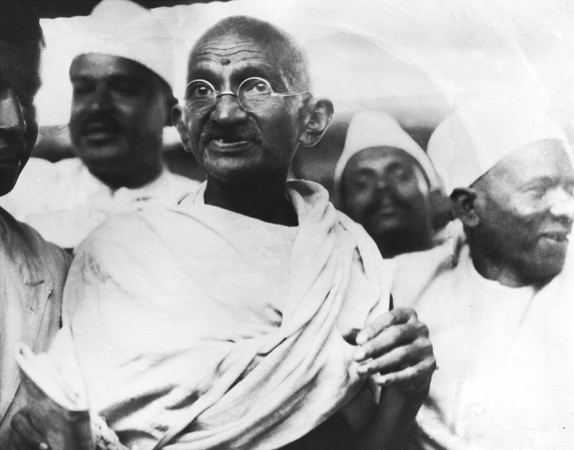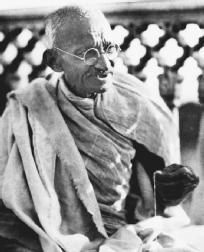 |
The hurt that's been done to us cuts sore like a knife, but we must not, repay in kind what has been done to us." This is a line from "No room for hate" a poem (David Gould); it portrays Gandhi's ability to feel no need for revenge or hatred towards mankind. He acts upon this by trying to cleanse the world of its greed and bring purity to mankind, through selflessness and tolerance. Gandhi was born on October 6, 1868, and died on January 30, 1948. Throughout his life, he strived to make an impact on the lives of people in poverty. He resigned from his job, sold his home, and descended to the lowest caste; he did this to represent the poor. Soon after, he initiated peaceful riots to demonstrate with and help people who had the same intentions. The word of his presence quickly spread and he became known as a peaceful movement's leader. Gandhi possesses selflessness and tolerance; he demonstrates these traits by peacefully helping and bringing charity to others. He uses selflessness to show he is willing to give his life for the well-being of others. His well-being and thoughts are all for the good of his people. He responds to other people's outbursts with tolerance because of his nature to understand one another's feelings and emotions. Through his tolerance, and selflessness, Gandhi portrays a hero. Gandhi wasn't corrupted with greed, hatred, or malice, but he was motivated by the corruption that he witnessed. He wanted to make changes it and have peace in the world.
 |
Gandhi freely offers his tolerance to others even though they may seem indignant or rough. He possesses great empathy in feeling other's troubles carrying their own burdens as his own. Through Gandhi's challenges he thought of people as intricate beings with stories of their own. He offered his understanding to all, even the people that come to arrest him after his peaceful protests. Gandhi believed that adding fuel to the fire would just wind up making the situation much worse, which is evident in this quote "An eye for an eye makes the whole world blind." This shows Gandhi's tolerance because he takes pain without retaliating, and he doesn't express his anger. Gandhi does not show display anger because he understands that other people may not even understand their own actions. Even through all the merciless beatings he has received, he never chose to react violently. He reacted through non-violent protests. Gandhi shows no anger even when people threaten him, he acts with concern toward them and gives in without a fight. This example portrays this philosophy. "While traveling in a first-class train compartment in Natal, Gandhi was asked by a white man to leave." Rather than argue or fight Gandhi spent the night in a train station meditating. He chose to peacefully retreat rather than react with hate or anger. In this example Gandhi shows by example how individuals can choose peaceful self reflection rather that outwardly directed hate. Gandhi believes that all human beings have good, and guilt, but just different ways of expressing these actions. This enables Gandhi to exhibit tolerance even when offended.
Although Gandhi can afford a much more alluring lifestyle he represents others and himself to be one. His intentions are for the people in poverty, not himself. Gandhi wears nothing but a loincloth. He wears this to firmly uphold his beliefs about poverty, and he uses this as a symbol to represent his people to the British government. "Prior to protest, Gandhi had been working to create a new life for himself and his family. He had bought a farm in Natal and lived a simple life, abandoning his Western dress for the simple cotton loincloth and shawl of Indian peasants or poor farmers. By 1906 Gandhi had become celibate, which means that he did not have sexual intercourse, and lived in voluntary poverty." Gandhi wishes to live a life of purity by example and to portray himself as a helper rather than a man of wealth. This also shows that Gandhi lived with contentment, and self-control. Gandhi is a statement to others because of his willingness towards others. Gandhi uses his passive ways to act in a way of defiance against the government; this shows his selflessness because of his goal to fight for others. "A British law taxed all salt used by Indians, a severe hardship on the peasant. In 1930, Gandhi began a famous 24-day "salt march" to the sea. Several thousand marchers walked 241 miles to the coast, where Gandhi picked up a handful of salt in defiance of the government." In this example Gandhi leads his people as in act of defiance to show that they deserve better than they have been receiving. Through his actions, he peacefully represents opposition to the government while at the same time, showing his people that they can also voice their opposition peacefully and work towards a better life. Gandhi is selfless through his own suffering and deprivation; he gives his people chances that they never had. He places the well being of his people and future generations to come before himself.
Throughout his life, Gandhi has carried out two traits that have made him an extraordinary being; these two traits are tolerance, and selflessness. He lived a life of abstinence and purity, without distraction. Gandhi inspires me because of the way he approaches troublesome situations, with no signs of fear or retreat, but with words of valor, tolerance and selflessness. He acts neither offended nor disrespected when he receives verbal abuse from the establishment. He has tremendous mental strength and generosity and is able to have empathy rather than hate or anger towards them. These are the reasons why Gandhi inspires others as well as me. In my eyes Gandhi is a hero. Due to his selflessness and tolerance, he stands apart from the rest of the greed consumed human beings. He has divine purity, lives for his people more so than his own self. Gandhi will forever represent a life lived with tolerance and selflessness, for the good of the underprivileged, and as a role model to all.
Page created on 1/16/2012 12:00:00 AM
Last edited 1/16/2012 12:00:00 AM
